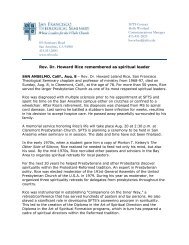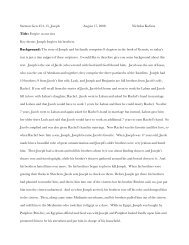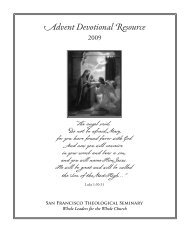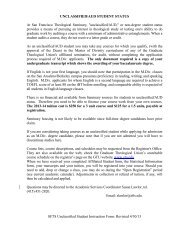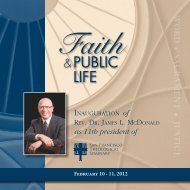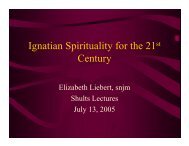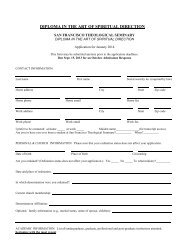Bev Franco Essay - San Francisco Theological Seminary
Bev Franco Essay - San Francisco Theological Seminary
Bev Franco Essay - San Francisco Theological Seminary
Create successful ePaper yourself
Turn your PDF publications into a flip-book with our unique Google optimized e-Paper software.
claimants for a person’s soul; while mammon, once it has its hooks in human flesh, will<br />
drag it where it wills, all the time whispering in to the ear dreams of self-aggrandizement.<br />
The marching orders of God and of mammon are in entirely different directions.” 18<br />
There can be no compromise or sharing of loyalty between God and Mammon as<br />
there can be between two employers. Instead, we will love one and hate the other. In<br />
Jewish thought, “love” and “hate” can have emotional connotations, or they can indicate<br />
choice. In the parallel phrase, Matthew uses νθέξεται, to cling to, and καταφρονήσει, <br />
to despise or scorn. To love and to cling to is to prefer; to hate and despise it to turn<br />
away. God acclaims Jesus, “You have loved righteousness and hated wickedness”<br />
(Hebrews 1:9a). Jesus warns the disciples, “Those who love their life lose it, and those<br />
who hate their life in the world will keep it for eternal life” (John 12:25). Jesus tells the<br />
disciples, “Whoever comes to me and does not hate father and mother, wife and children,<br />
brothers and sisters, yes, and even life itself cannot be my disciple” (Luke 14:26). In<br />
these cases, love and hate do not indicate emotion, but choice. Jesus is asking to make a<br />
simple choice: God or materialism. We can only serve one.<br />
Haughey also tells us, “Another symptom of mammon illness is that we become<br />
so taken up with self-provision and invested in the immediate objects of our trust that we<br />
become unaware of others and their needs. One in fact becomes neighbor-numb, not<br />
necessarily because of any intentional callousness but because there is so little time to<br />
attend to anything or anyone else except our own objects of trust and ourselves.” 19<br />
Materialism changes the way we look at the world.<br />
18 Davies, 642.<br />
19 Haughey, 6.<br />
7



